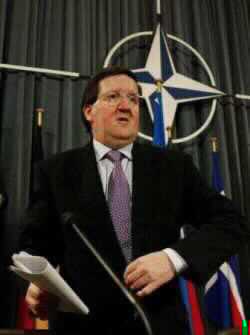NATO military planners start work on Monday on steps to protect Turkey after the defense alliance broke a month-long deadlock over preparations for a possible U.S.-led war against Iraq. But as the planners get down to business, NATO nations will be surveying the damage inflicted on the credibility of their 54-year-old defense alliance.
NATO Secretary-General George Robertson struggled all through last year to reassert the primacy of NATO, which critics had said was sidelined by the United States after the September 11, 2001, attacks on U.S. cities.
He was a driving force behind the creation of a new forum for cooperation between NATO and its old Cold War enemy, Russia, and he steered a "transformation" of the 19-nation alliance to gear for modern security threats.
Unbowed by a crisis diplomats say may have set his work back, Robertson told a news conference that Sunday had turned out to be a "remarkable day" because it signaled NATO's readiness to stand by an ally under threat, its core principle.
"Alliance solidarity has prevailed," he said.
Planning will now start for the possible deployment of AWACS surveillance planes, Patriot air defense missiles and anti-chemical and anti-germ warfare units to Turkey, which would be on the frontline in a war against Iraq.
The deal took 13 hours for NATO ambassadors to reach on Sunday, and France was not in the room because Robertson had to take the issue to NATO's Defense Planning Committee -- on which Paris has no seat -- to bypass its resistance.
France is not included on the Defense Planning Committee because it withdrew from the integrated military structure of the alliance in 1966. The forum was used to get round French objections during the 1991 Gulf War when NATO sent its Allied Command Europe Mobile Force to southeastern Turkey.
FRANCE REMAINS DEFIANT
Belgium and Germany had held out until Sunday with France, arguing that it was premature for the alliance to take steps that could imply acceptance of military action while U.N. weapons inspectors were still trying to disarm Iraq peacefully.
The trio's stand had exacerbated strains both across the Atlantic and within Europe on how to deal with Iraq.
Sunday night's solution partially cleared the air ahead of a European Union summit on Iraq on Monday, at which the 15-nation bloc's divided leaders will struggle to find common ground.
Paris, which has called for more time and a reinforced inspection regime in Iraq, remained defiant at NATO.
"Turkey does not face any threats at the moment," French Foreign Minister Dominique de Villepin told RTL radio.
"We have...bilaterally indicated to Turkey that we will of course offer every guarantee we can. So there is no ambiguity toward Turkey, there is no lack of solidarity."
In a move diplomats said may have been designed to avoid an impression that Paris was isolated, France, Germany and Belgium issued a joint statement immediately after the NATO meeting. They said Baghdad must disarm but war must be a last resort.
"In particular, they underline that the use of force can only be the last resort and that not all options offered by (U.N. Security Council resolution) 1441 have, as yet, been fully exploited," the three countries said.
Belgium had held out during Sunday's meeting for language in the "decision sheet" which one diplomat said, "Came perilously close to subordinating NATO to the United Nations."
A paragraph it had proposed was eventually wiped out during the negotiations and replaced with three, one of which said the allies continued to "support efforts in the United Nations to find a peaceful solution to the crisis."
Belgian Prime Minister Guy Verhofstadt said Belgium had succeeded in persuading its allies to agree on wording, which spelt out, that any help for Turkey must be purely defensive and must "not be a first step in the preparations for a war."
"If everybody recognizes we have to deal with this crisis in the United Nations...then we can find a solution," he told a midnight news conference
PHOTO CAPTION
NATO Secretary General George Robertson leaves the room after a news conference at the alliance headquarters in Brussels, Feb. 16, 2003. NATO broke its deadlock over planning for the defense of Turkey in the event of a U.S.-led war against Iraq on Sunday after hours of wrangling in a committee where France, which had blocked the move, has no seat. (Yves Herman/Re
- Author:
& News Agencies - Section:
WORLD HEADLINES


 Home
Home Discover Islam
Discover Islam Quran Recitations
Quran Recitations Lectures
Lectures
 Fatwa
Fatwa Articles
Articles Fiqh
Fiqh E-Books
E-Books Boys & Girls
Boys & Girls  Hajj Rulings
Hajj Rulings Hajj Fatwas
Hajj Fatwas














